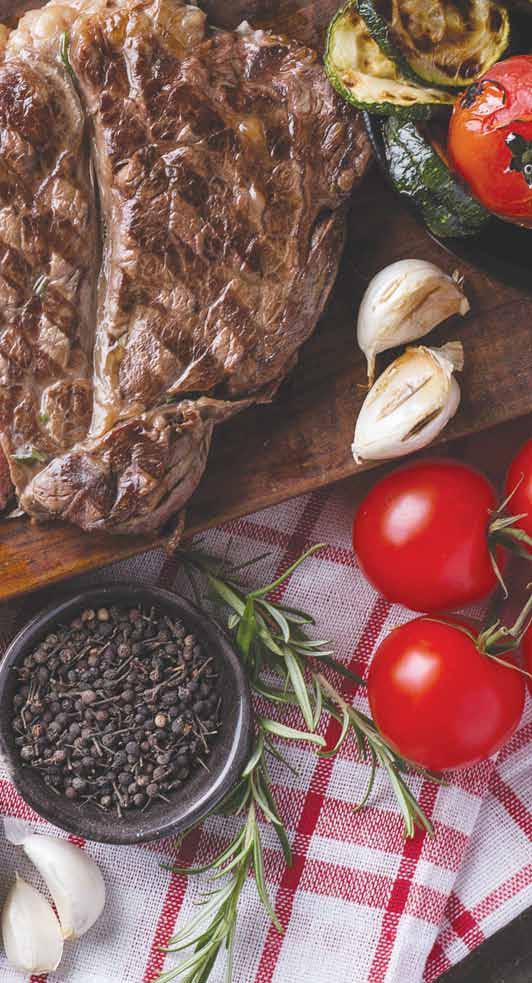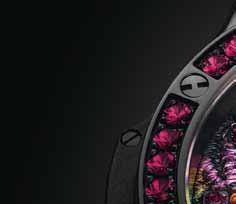
7 minute read
What›s the Beef with Red Meat
from Jared Kushner to Majalla: “If Palestinians Come to the Table, the U.S. Will Be Flexible”
by المجلة
ealth H
A recent study suggested that eating red or processed meats won›t necessarily harm your health. What is the truth? What›s the Beef with Red Meat?
by Harvard Men›s Health Watch
The news headlines were everywhere: «It›s Okay to Eat Red Meat.» The source for this statement was a study published online Oct. 2019 ,1, in Annals of Internal Medicine. An international team of researchers conducted five systematic reviews that looked at the effects of red meat and processed meat on multiple health issues, such as heart disease, cancer, diabetes, and premature death.
either red meat or processed meat is harmful. Their advice: there›s no need to reduce your regular red meat and processed meat intake for health reasons.

Unsurprisingly, the backlash from the science community was sharp and swift. For instance, Harvard›s T.H. Chan School of Public Health issued a statement that the new advice could potentially harm people›s health.
«This new red meat and processed meat recommendation was based on flawed methodology and a misinterpretation of nutritional evidence,» says Dr. Frank Hu, chair of the Department of Nutrition. «The authors used a method often applied to randomized clinical trials for drugs and devices, which is typically not feasible in nutritional studies.»
A LOOK AT THE EVIDENCE
The study and its widespread reaction have once again brought up the question of whether red meat and processed meat are bad for your health and if people should cut them out or simply cut back. So what are the facts? Here›s a look at the main issues and questions regarding the role of red and processed meats in your diet.
Red and processed meats do increase health risks. In spite of what the Annals of Internal Medicine study suggests, Dr. Hu says that an accumulated body of evidence shows a clear link between high intake of red and processed meats and a higher risk for heart disease, cancer, diabetes, and premature death. «The evidence is consistent across different studies,» he says.
But the key word here is «high.» Dr. Hu points out that the exact amounts for safely consuming red meat are open to debate.
ealth H

«The evidence shows that people with a relatively low intake have lower health risks,» he says. «A general recommendation is that people should stick to no more than two to three servings per week.»
Dr. Hu suggests that people focus not so much on actual serving sizes, but rather on red meat›s placement in meals. «Instead of the main course, use red meat as a side dish,» he says. «Consider red meat a luxury and not a staple food.
For processed meat, Dr. Hu says there is a much stronger association with a higher risk of heart disease and cancer (especially colon cancer).
Processed meat products contain high amounts of additives and chemicals, which may contribute to health risks. «Again, there is not a specific amount that is considered
safe, so you should keep processed meat intake to a minimum,» he says. You don›t need to eat red meat. Red meat has high amounts of protein, which helps promote muscle growth, and vitamin B12 to make red blood cells. For example, a -3ounce serving has about %45 of the Daily Value (DV) of protein and %35 of the DV for B12. A serving of red meat is also a good source of zinc, which can help the body produce testosterone, and selenium, a powerful antioxidant. Plus, red meat is rich in iron. However, Dr. Hu says that you don›t need to eat red meat to get these essential nutrients. «You can get the same

amounts -- and in some cases even more -- from poultry, fish, eggs, and nuts, and as well as by following a plant-based diet.»
Some kinds of red meat are not necessarily healthier. There are no firm studies that have shown nutritional or health advantages from eating organic or grass-fed beef.
«These types of red meat are often more desirable as they contain low or no growth hormones compared with grain-fed beef, but it›s still not clear if they offer any health benefits,» says Dr. Hu.
Po rt

ra it
Mikhail Mishustin: From LittleKnown Tax Chief to the Second Most Powerful Politician in Russia
Majalla - London
When Russians woke up on the morning on January 16, few knew the name Mikhail Vladimirovich Mishustin, the head of the country’s tax service. But by the time they went to bed that night, Mishustin had been named as Russia’s new prime minister and the second most powerful politician in the country amid reforms that could potentially extend Putin’s grip on power after his presidential term ends in 2024. Born in Moscow in 1966, Mishustin’s career has been largely technocratic up until now. He started out work at an information technology non-profit but entered the state tax service as an assistant in 1998. He has worked in tax collection since then, has headed the Federal Tax Service since 2010. Mishustin is similar to his predecessor Medvedev in embracing technology and has been widely credited with digitalizing the Russian tax system. This led to a drop in tax evasion as well as bringing many smaller businesses into the formal economy. «Few people love tax specialists, but Mishustin managed to maintain a pretty decent reputation,» said political scientist and professor at the Higher School of Economics Alexey Makarkin. In 2008, he also served as the head of Russian investment company UFG, which at the time worked with Germany›s Deutsche Bank. Despite his tax-focused career, Mishustin initially trained as an engineer, graduating from Moscow›s STANKIN MachineInstrument Institute (currently Moscow State Technological University STANKIN) in 1989. He has a PhD in economics, according to his official biography. Just last year, Mishutin told the Kommersant newspaper that Russia needed to embrace artificial intelligence and digital technology, saying «if we don›t understand how this world is developing and what its rules are, if we insist our country is part of the old order, this new world will make us its victim.» Like Putin, the newly-appointed prime minister a hockey fan and has been seen at matches with security services officials in Moscow. According to Bloomberg, Mishustin developed a relationship with Putin as a member of the president’s Night Hockey League, and he is also a member of the board of Russia’s Ice Hockey Federation. Mishustin is reportedly an enthusiastic pianist and composer who has written a number of songs for well-known Russian singers, according to the Russian financial newspaper Vedomosti. Forbes Russia listed him as the 54th best-paid state official in 2015 with earnings of 183.31 million rubles (around 3$ million; 2.7€ million). His wife reported earnings of 47.709 million rubles in the reported period, according to Reuters news agency. His personal wealth appears relatively modest compared to his predecessor, who was repeatedly accused by opposition leader Alexei Navalny of graft.























